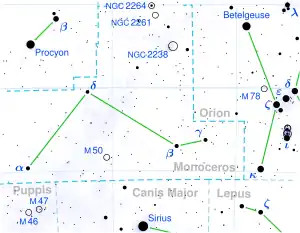 | |
| Observation data Epoch J2000 Equinox J2000 | |
|---|---|
| Constellation | Monoceros |
| Right ascension | 07h 10m 13.68177s[1] |
| Declination | −04° 14′ 13.5829″[1] |
| Apparent magnitude (V) | 4.92[2] |
| Characteristics | |
| Evolutionary stage | horizontal branch[3] |
| Spectral type | K0III[4] |
| U−B color index | +0.78[2] |
| B−V color index | +1.03[2] |
| Astrometry | |
| Radial velocity (Rv) | +77.74[5] km/s |
| Proper motion (μ) | RA: −0.714[1] mas/yr Dec.: +217.298[1] mas/yr |
| Parallax (π) | 16.8419 ± 0.1692 mas[1] |
| Distance | 194 ± 2 ly (59.4 ± 0.6 pc) |
| Absolute magnitude (MV) | 0.94[6] |
| Details[7] | |
| Mass | 1.07±0.20 M☉ |
| Radius | 10.25±0.11[1] R☉ |
| Luminosity | 46.36±0.56[1] L☉ |
| Surface gravity (log g) | 2.53±0.10 cgs |
| Temperature | 4,714±46 K |
| Metallicity [Fe/H] | −0.25±0.03 dex |
| Rotational velocity (v sin i) | 2.33±0.50 km/s |
| Age | 5.75±2.85 Gyr |
| Other designations | |
| Database references | |
| SIMBAD | data |
20 Monocerotis is a single[9] star located about 194[1] light years away from the Sun in the equatorial constellation of Monoceros. It is visible to the naked eye as a faint, orange-hued star with an apparent visual magnitude of 4.92.[2] The star is receding from the Earth with a heliocentric radial velocity of +78 km/s.[5]
This object is an aging giant star with a stellar classification of K0 III.[4] It is a red clump giant,[3] which indicates it is on the horizontal branch and is generating energy through helium fusion at its core. The star is around six[7] billion years old with 1.1 times the mass of the Sun. After exhausting the supply of hydrogen at its core, it has expanded to 10.3[1] times the Sun's radius. It is radiating 46[1] times the luminosity of the Sun from its swollen photosphere at an effective temperature of 4,714 K.[7]
In addition to the primary, three visual companions have been reported: component B, with magnitude 12.93 and separation 67.8", C, with magnitude 10.16 and separation 167.9", and D, with magnitude 12.46 and separation 102.3".[10]
References
- 1 2 3 4 5 6 7 8 9 10 Brown, A. G. A.; et al. (Gaia collaboration) (August 2018). "Gaia Data Release 2: Summary of the contents and survey properties". Astronomy & Astrophysics. 616. A1. arXiv:1804.09365. Bibcode:2018A&A...616A...1G. doi:10.1051/0004-6361/201833051. Gaia DR2 record for this source at VizieR.
- 1 2 3 4 Ducati, J. R. (2002). "VizieR Online Data Catalog: Catalogue of Stellar Photometry in Johnson's 11-color system". CDS/ADC Collection of Electronic Catalogues. 2237. Bibcode:2002yCat.2237....0D.
- 1 2 Puzeras, E.; et al. (October 2010), "High-resolution spectroscopic study of red clump stars in the Galaxy: iron-group elements", Monthly Notices of the Royal Astronomical Society, 408 (2): 1225–1232, arXiv:1006.3857, Bibcode:2010MNRAS.408.1225P, doi:10.1111/j.1365-2966.2010.17195.x, S2CID 44228180
- 1 2 Hoffleit, D.; Warren, W. H. (1995). "VizieR Online Data Catalog: Bright Star Catalogue, 5th Revised Ed. (Hoffleit+, 1991)". VizieR On-line Data Catalog: V/50. Originally Published in: 1964BS....C......0H. 5050. Bibcode:1995yCat.5050....0H.
- 1 2 Jofré, E.; Petrucci, R.; Saffe, C.; Saker, L.; Artur de la Villarmois, E.; Chavero, C.; Gómez, M.; Mauas, P. J. D. (2015). "Stellar parameters and chemical abundances of 223 evolved stars with and without planets". Astronomy & Astrophysics. 574: A50. arXiv:1410.6422. Bibcode:2015A&A...574A..50J. doi:10.1051/0004-6361/201424474. S2CID 53666931. Vizier catalog entry
- ↑ Anderson, E.; Francis, Ch. (2012). "XHIP: An extended hipparcos compilation". Astronomy Letters. 38 (5): 331. arXiv:1108.4971. Bibcode:2012AstL...38..331A. doi:10.1134/S1063773712050015. S2CID 119257644. Vizier catalog entry
- 1 2 3 Jofré, E.; et al. (2015). "Stellar parameters and chemical abundances of 223 evolved stars with and without planets". Astronomy and Astrophysics. 574: A50. arXiv:1410.6422. Bibcode:2015A&A...574A..50J. doi:10.1051/0004-6361/201424474. S2CID 53666931.
- ↑ "20 Mon". SIMBAD. Centre de données astronomiques de Strasbourg. Retrieved 2019-05-31.
- ↑ Eggleton, P. P.; Tokovinin, A. A. (2008), "A catalogue of multiplicity among bright stellar systems", Monthly Notices of the Royal Astronomical Society, 389 (2): 869, arXiv:0806.2878, Bibcode:2008MNRAS.389..869E, doi:10.1111/j.1365-2966.2008.13596.x, S2CID 14878976.
- ↑ Mason, Brian D.; Wycoff, Gary L.; Hartkopf, William I.; Douglass, Geoffrey G.; Worley, Charles E. (2001). "The 2001 US Naval Observatory Double Star CD-ROM. I. The Washington Double Star Catalog". The Astronomical Journal. 122 (6): 3466. Bibcode:2001AJ....122.3466M. doi:10.1086/323920. Vizier catalog entry